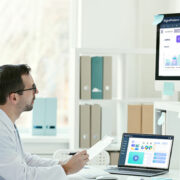Medical Identity Theft Prevention Enhances Patient Trust

What is one of the crucial things a company needs to ensure so that it can thrive? Is it the employees, revenue, or size? While many may answer something along the lines of the previously mentioned characteristics, one of the most critical assets a company can have is the trust of its customers. The healthcare system is no different – various health systems and hospitals are successful today only because of their patients’ trust in their services. Since it is healthcare, patients put their lives in the hands of the hospitals – trust plays a huge role here. That trust can be enhanced with medical identity theft prevention.

According to Morning Consult, in terms of trust from consumers, healthcare lies in the middle, while insurance, finance, and real state are underneath it, whereas airlines and technology are above it.
Morning Consult conducted a study which had several respondents about their perception regarding various US brands as well as firms. From these people, a meager 16% responded that they trust health systems a lot, whereas 36% said that they believe these organizations somewhat.
Also, while ranking the most trustworthy companies, people, ideas, among other things, the respondents ranked their physicians even above notable choices such as Google, police, and leaders.
Thankfully, the report went deeper and gave areas of improvement for hospitals and health systems to build up trust among patients. When the sample of the study was asked what the most crucial factor which helps build trust towards an organization is, three-fourth of the respondents said that protecting their sensitive data was extremely important for trust-building.
All of these are straight from the customers themselves, and these are even more applicable to the US healthcare system. The health systems and hospitals need to ensure that the sensitive patient data they keep are safeguarded, especially now. Breaches seem to be very common nowadays, which leads to exposure to the patients’ confidential medical data as well as documents like medical images, medication, and so on. It costs both patients and healthcare providers alike – patients become victims of medical identity theft, whereas healthcare providers’ reputations are dented. People question the security surrounding the medical records since HIPAA requires strict safeguarding of such sensitive information.
These lead to losses for both patients and health systems – patients may sue the hospitals, the culprits may use the identities to avail services illegally, costing the patients a significant amount of money for services that they never used. Medical identity theft may also occur if an individual steals a patient’s medical credentials and uses it for his/her gain. In such cases, the preferences of the culprit may get mixed up with that of the patients. For instance, the patient might be allergic to certain medications, and may still receive that after the culprit uses his/her ID.
Dynamic healthcare providers such as Novant Health, Terrebonne General Medical Center, and University Health Care System are preventing such issues by using RightPatient. It is a biometric patient identification platform that locks the medical records after attaching those with the biometric data of the patients. Once a patient enrolls with the biometric data, for instance, irises or fingerprints, the records can be accessed using only the same data, creating medical identity theft prevention. The hospital can also identify the accurate patient record within seconds after the patient scans his/her biometric data for verification. RightPatient not only aids in medical identity theft prevention, but also eliminates patient matching errors, ensuring accurate patient identification, enhancing patient safety, and improving the revenue cycle as well. It saves lives as well as millions for both patients and health systems, enhancing patient trust.









Leave a Reply
Want to join the discussion?Feel free to contribute!